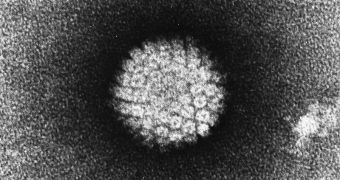According to a new study conducted by researchers at the National Cancer Institute (NCI), in Bethesda, Maryland, women who receive a single dose of the human papillomavirus (HPV) vaccine exhibit antibodies in their bloods for up to four years after the injection.
The research shows that even a single HPV shot can be effective in preventing the development of cervical cancer.
The research, published in the American Association for Cancer Research's journal Cancer Prevention Research, suggests that single exposures to the vaccine can generate a series of long-term immune system responses that protect women against additional HPV infections.
The data used in the study were collected from the Cervarix phase III clinical trial the NCI conducted on women in Costa Rica. Due to a variety of factors, around 20 percent of test subjects received less than the recommended three doses of the HPV vaccine.
Scientists collected blood samples from 78 women who had received a single dose of the HPV vaccine, from 192 women who had received two doses, and 120 women who had received all three doses. The team compared antibody concentrations throughout all samples, looking for connections.
“We wanted to evaluate whether two doses, or even one dose, of the HPV 16/18 L1 VLP vaccine [Cervarix] could induce a robust and sustainable response by the immune system,” explains investigator Mahboobeh Safaeian, PhD, from the NCI Division of Cancer Epidemiology and Genetics.
“We found that both HPV 16 and HPV 18 antibody levels in women who received one dose remained stable four years after vaccination. Our findings challenge previous dogma that protein subunit vaccines require multiple doses to generate long-lived responses,” she goes on to say.
Statistics from the US Centers for Disease Control and Prevention (CDC) indicate that only 54 percent of girls aged 13 to 17 received HPV vaccines last year. Of these women, only about a third received all three recommended doses of the vaccine.
After studying the blood samples, the team determined that all women in the research had HPV antibodies. There were insignificant differences in antibody concentrations between women who had received two doses of the vaccine, compared to women who had also received a third injection six months later.
“Our findings suggest promise for simplified vaccine administration schedules that might be cheaper, simpler, and more likely to be implemented around the world,” Safaeian concludes.

 14 DAY TRIAL //
14 DAY TRIAL //